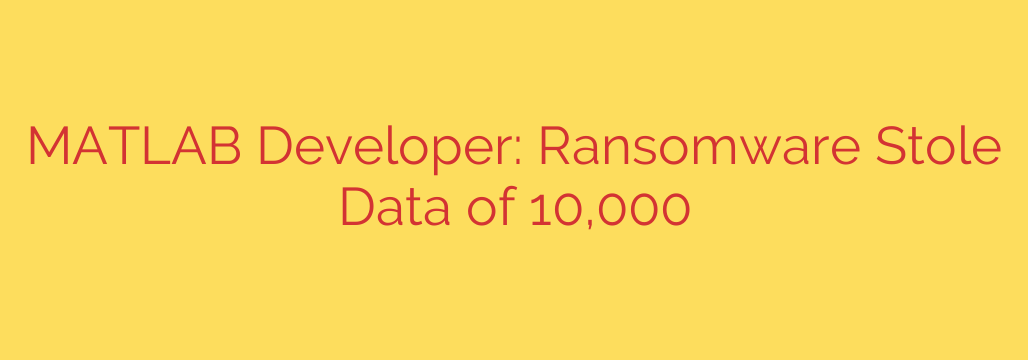
Major Data Breach Hits MATLAB Community: 10,000 Users Affected by Ransomware Attack
A prominent third-party developer known for creating tools and add-ons for the MATLAB environment has been hit by a significant cybersecurity incident, exposing the personal data of approximately 10,000 users. The breach was the result of a targeted ransomware attack, highlighting the growing threat that cybercriminals pose to specialized software communities.
This event is a serious reminder that data security is paramount, not just for large corporations, but for developers and users within any technical ecosystem. Here’s what you need to know about the attack and the steps you should take to protect yourself.
The Anatomy of the Attack
According to reports, the developer’s systems were infiltrated by a sophisticated ransomware variant. Unlike older forms of ransomware that simply encrypted files and demanded payment for their release, modern strains often perform a “double extortion.” Before encrypting the system, the malware first exfiltrates, or steals, large volumes of sensitive data.
The attackers then use this stolen data as leverage. If the victim refuses to pay the ransom for the decryption key, the criminals threaten to leak the compromised information publicly or sell it on dark web forums. This breach involved the theft of a user database before the ransomware was deployed, putting the personal information of thousands at risk.
What Information Was Compromised?
The stolen data reportedly includes a range of personally identifiable information (PII) that could be used for further malicious activities, such as phishing, identity theft, or credential stuffing attacks.
The compromised information is believed to include:
- Full names
- Email addresses
- Usernames
- Hashed passwords
- Purchase histories or license information
While passwords were confirmed to be hashed—a process that scrambles them for security—certain hashing algorithms can be vulnerable to brute-force attacks. Therefore, it’s critical to treat these passwords as fully compromised.
Immediate Steps for Affected Users: How to Protect Yourself
If you have ever purchased or downloaded tools from third-party MATLAB developers, it is essential to take proactive security measures immediately, even if you haven’t received a notification.
1. Reset Your Passwords Immediately: The most critical step is to change your password for any account associated with the affected developer. More importantly, if you reused that same password on other websites or services—such as your email, banking, or social media—change those immediately as well. Use a unique, complex password for every account.
2. Enable Multi-Factor Authentication (MFA): Wherever possible, enable MFA (also known as two-factor authentication or 2FA) on your accounts. MFA requires a second form of verification, like a code sent to your phone, in addition to your password. This single step can block over 99% of account compromise attacks.
3. Beware of Phishing Scams: Cybercriminals will likely use the stolen email addresses to launch targeted phishing campaigns. Be extremely suspicious of any unsolicited emails that claim to be from the developer, MathWorks, or other tech companies. Do not click on links or download attachments from suspicious emails. Look for tell-tale signs of phishing, such as grammatical errors, urgent calls to action, or email addresses that don’t match the official domain.
4. Monitor Your Accounts: Keep a close eye on your financial and online accounts for any unusual activity. If you notice unauthorized logins or transactions, report them to the respective service provider and your financial institution right away.
A Broader Warning for Niche Communities
This attack underscores a troubling trend: cybercriminals are increasingly targeting smaller, specialized software ecosystems. Developer communities are valuable targets because they often possess intellectual property, and their user accounts can serve as a gateway to larger corporate networks.
Developers, in turn, must prioritize security and adopt a “zero trust” mindset. Storing user data securely, enforcing strong access controls, and having a robust incident response plan are no longer optional—they are essential. For users, this incident is a powerful lesson in digital hygiene and the importance of using unique passwords and MFA as a standard practice. Staying vigilant is the best defense against the fallout from data breaches like this one.
Source: https://www.bleepingcomputer.com/news/security/matlab-dev-says-ransomware-gang-stole-data-of-over-10-000-people/








